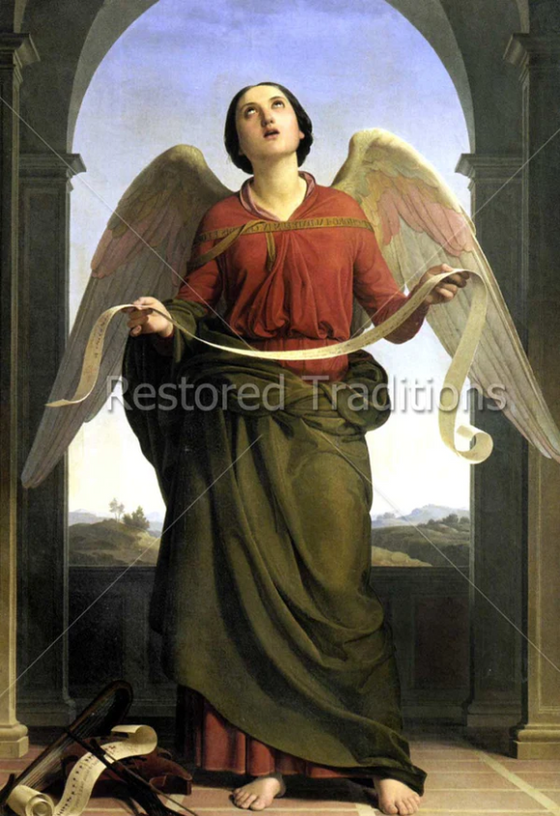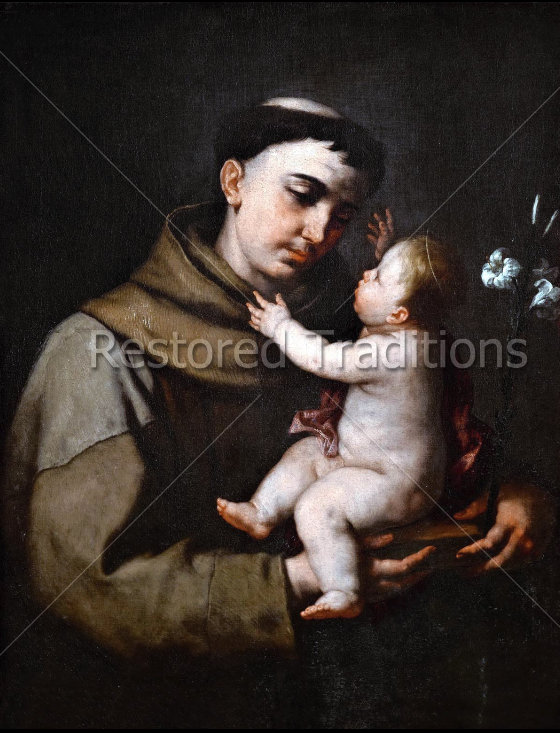I usually see at the end of the year how many times an image was downloaded from Restored Traditions. This time around, I thought it would be a nice change to rank the artists on our website based off which ones get the most downloads. So, after pouring through our sales data, I compiled this list of the five most popular (all dead, R.I.P.) artists for 2013.
I'm not here to give a comprehensive biography of these guys or tell about their nuances – there's plenty on the internet already. I rather prefer to give a commentary of why I think the work of each artist is so popular in the context of Catholic art.
So, ranked from most to least (there was the difference of one download between first and second place — sorry Charles) downloaded artists, here you go:

A Danish painter who lived in the 19th century and a good friend of Hans Christian Anderson, the author, Carl Bloch is best known for his striking Life of Christ paintings.
He's the number-one artist on our site, because his renditions are simple and realistic. I've had people tell me they really like his work, because he makes Jesus Christ look majestic and Divine while at the same time making Him look like someone you could meet at the grocery store in 2014.
As a side note, Bloch had a fun sense of humor when he subtly painted children staring at you in his paintings. Click here to read our blog post on that bit.

He's been called the Norman Rockwell of the Catholic church, and he was born in St. Louis the same year Brahms' 3rd Symphony in F premiered (1883). Charles Chambers was an illustrative artist who painted with a distinct style that Americans took to like ducks to water.
His most famous work is the Light of the World, which is a portrait of Christ as a boy. However, Chambers covered quite a bit of painting ground before his death in 1964. He painted for monasteries and churches in Chicago and on the East coast. He created Crusaders we could be inspired by, and his brush painted renditions of the Sacred and Immaculate Hearts that even fallen-away Catholics cant forget.
I can't tell you how many people I've talked to over the years who grew up with his work in their 3rd-grade classroom (I'm 30) or who had a Grandpa Murry with a Chamber's Immaculate Heart picture on the '57 Chevy dashboard.
Charles wasn't popular because of an artistically-nuanced art style that only people in Seattle coffee shops could pretend to understand; he was popular (and still is) because his simple artwork touched, and touches, a nostalgic vein in the American consciousness that stirs a deeper movement towards God.

I think that the same juice Bloch and Chambers created with, Murillo drank too. Well, that's a bit of a stretch, considering he lived before the both of them in 17th century Spain.
To get more to the point, our Spaniard friend painted tons of religious artwork as well as lots of every-day scenes. His most downloaded painting we have at Restored Traditions is the Adoration of the Shepherds. You've probably seen it on 17 Christmas cards and two calendars at this point in your life.
I think it's really interesting that Esteban paints with a very similar realism to Bloch and Chambers, even though he lived a couple hundred years earlier. I would say that his skill for detail surpasses Chambers, but I think it's on an even playing field with Bloch.

And what would a top-five list be without the Frenchman Bouguereau? By this point in your life, whether you realize it or not, you've seen his art on calendars, wedding invitations and refrigerators.
Hands down, his best piece people buy from us is L'Innocence, which shows Our Lady walking through a forest holding a sleeping child Jesus and an awake lamb. It's certainly his most iconic piece, though there are many other beautiful religious paintings he did.
I think William is more in the ballpark of Bloch (#1 artist in this post) in terms of style and color. Both were family men and painted spiritual subjects in a way we can easily connect with in the 21st century.
Though it's not the most popular of his works, my favorite Bouguereau is the Thanks Offering. Being a family man, I love seeing a mom and daughter patiently sitting and praying to a statue of the Blessed Virgin Mary. When I look at the image, I almost feel that I'm looking at my own family. You see the emotion of the mother and daughter, while subtly seeing the statue of Our Lady in the upper left corner and a small rosary and prayer book in the lower right.
That's two Frenchmen in a row, and they both lived in the 19th century. So how did James Tissot get on this list, and why do people still buy his stuff 112 years after his death? I'll tell you with one word: theme.
James Tissot found a nifty niche painting watercolor scenes from the life of Christ. But make no mistake, this guy didn't paint the stuff you've already seen in Bloch or Bouguereau paintings. No, instead of painting the Adoration of the Magi or Jesus and the Children (relatively common art themes in Catholic art), this guy goes ahead and paints a watercolor of the Journey of the Magi (three kings riding camels). There's nothing spectacular about this work other than the fact that no else has it, which is exactly why lots of people download it from us: no one else has it, and it's a different turn on the same story.
James Tissot may be at the bottom of our top-five list this year. However, though you may not love his illustrative style, we love the fact that he has lots of scenes that no one else ever painted.
Comments will be approved before showing up.


Discover the Timeless Treasures of Rare Catholic Art
Immerse yourself in the rich history and spiritual depth of rare Catholic art with Restored Traditions, the premier source for digitally restored masterpieces. As an art director or creative director, you understand the power of visually compelling imagery to captivate and inspire your audience. Our extensive collection of royalty-free and copyright-free Catholic art offers you an unparalleled opportunity to elevate your projects with works of historical significance and profound beauty.
Since 2006, we have been dedicated to preserving and sharing the artistic legacy of the Catholic Church. Our team of expert digital restorers meticulously brings these rare pieces back to life, ensuring that every brush stroke and intricate detail is captured in high-resolution digital format. With over 30,000 satisfied customers worldwide, we have established ourselves as the trusted choice for those seeking authentic and impactful Catholic art.
One such masterpiece in our collection is the artwork depicting the life and legacy of St. Anthony of Padua. Born Fernando Martins de Bulhões in Lisbon, Portugal, St. Anthony’s journey from an Augustinian monk to a revered Franciscan preacher is a testament to his unwavering faith and spiritual wisdom. By incorporating the artwork of St. Anthony and other rare Catholic pieces into your designs, you can create a unique and meaningful connection with your audience.
As an art director or creative director, you have the power to shape the visual narrative of our time. Let restoredtraditions.com be your partner in telling stories that resonate with the human spirit. Explore our extensive selection of rare Catholic art today and unlock a world of inspiration and historical significance for your projects.
Patrick Werick
Author